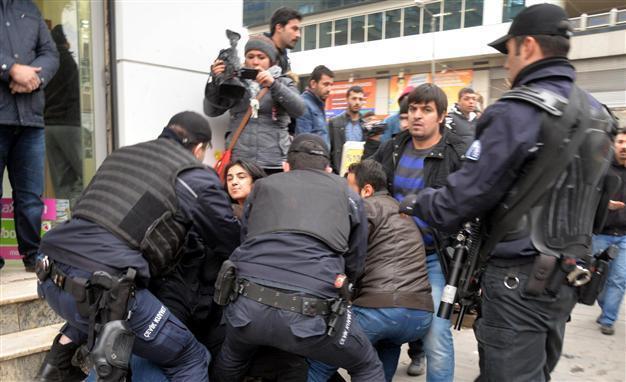Turkish government pushing for bill on security amid heated row
ANKARA

DHA Photo
The government has vehemently defended its contentious new security bill, which was postponed after being scheduled to begin on Feb. 4, amid strict objections from all opposition parties, who argue that the bill signals a return to the “police state” in Turkey.“For a few days, redundant black propaganda that is completely based on disinformation has been conducted. Like what? ‘Two years [imprisonment] for the use of a slingshot, one year [imprisonment] for the use of weapons.’ These are utter lies,” Interior Minister Efkan Ala told a group of reporters on Feb. 3, before attending the weekly parliamentary group meeting of his ruling Justice and Development Party (AKP).
“If the slingshot is at one’s home, then there is no problem. But if you take an iron marble slingshot - which is like a catapult and has a bullet-like effect - to a demonstration, meeting or rally, only then will you get the penalty that you get when attending anywhere with a licensed weapon,” Ala said.
This week, General Assembly meetings are planned at parliament, not only on regular working days of the week, but also on Friday and Saturday.
The picture of the draft homeland security bill painted by the government and the three opposition parties at parliament - namely the main opposition Republican People’s Party (CHP), the Nationalist Movement Party (MHP) and the Peoples’ Democratic Party (HDP) - have been in stark contrast.
The opposition parties have claimed that adoption of the bill in its current form could be regarded as a return to the infamous Sept. 12 military coup d’état regime.
However, the government says the package contains no provisions that restrain citizens’ fundamental rights and freedoms.
The draft bill proposes an expansion of the police’s search and detention powers. It would also give provincial governors the authority to suspend the law and the use of fundamental rights, as was the case in large parts of the southeast of Turkey under the Emergency Rule Region (OHAL) regime between 1987 and November 2002.
In December, Human Rights Watch warned that the draft law proposes to give the highest administrative officer of a province, the governor, authority to assume powers that rightly belong to the prosecutorial authorities.
The draft bill states: “Where necessary and where there is a need for urgent measures, a governor can give direct orders to the police chief or public officials to shed light on a crime and to find the perpetrators of the crime.”
As governors are part of the executive branch and are directly appointed by the government in Ankara, allowing them to order police “to shed light on a crime” opens the door to governors directing police investigations, Human Rights Watch stated.
















